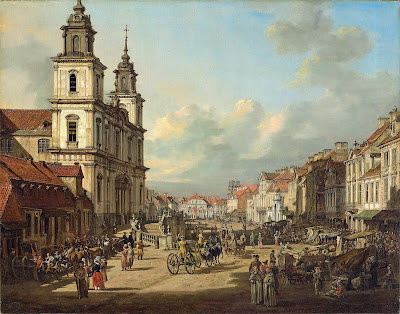Now, my knowldge of Polish history is pretty much confined to the period from the late 18th century to now, so this edition of In Our Time was a revealtion.
 |
| Warsaw, 1778 |
It is streaming now and will be avaibale soon, by following the link. link.
"Melvyn Bragg and guests discuss the republic that emerged from the union of The Polish-Lithuanian Commonwealth.
At first this was a personal union, similar to that of James I and VI in Britain, but this was formalised in 1569 into a vast republic, stretching from the Baltic to the Black Sea.
Kings and princes from across Europe would compete for parliament to elect them King and Grand Duke, and the greatest power lay with the parliaments.
When the system worked well, the Commonwealth was a powerhouse, and it was their leader Jan Sobieski who relieved the siege of Vienna in 1683, defeating the Ottomans.
 |
| Polish - Lithuanian Commonwealth, 1619-1621 |
Its neighbours exploited its parliament's need for unanimity, though, and this contributed to its downfall. Austria, Russia and Prussia divided its territory between them from 1772, before the new, smaller states only emerged in the 20th Century.
With Robert Frost, The Burnett Fletcher Chair of History at the University of Aberdeen, Katarzyna Kosior, Lecturer in Early Modern History at Northumbria University, and Norman Davies, Professor Emeritus in History and Honorary Fellow of St Antony’s College, University of Oxford
Producer: Simon Tillotson"
Location; The Polish-Lithuanian Commonwealth
Pictures; Church of the Holy Cross in Warsaw, 1778,Bernardo Bellotto, and Polish - Lithuanian Commonwealth at its greatest extent in years 1619 - 1621, 2018, Praca własna na podstawie, https://commons.wikimedia.org/wiki/File:Poland-Lithuania_1714.svg author Tonhar, licensed under the Creative Commons Attribution 3.0 Unported license.
*The Polish-Lithuanian Commonwealth, In Our Time, Radio 4, https://www.bbc.co.uk/programmes/m0010f8z
No comments:
Post a Comment